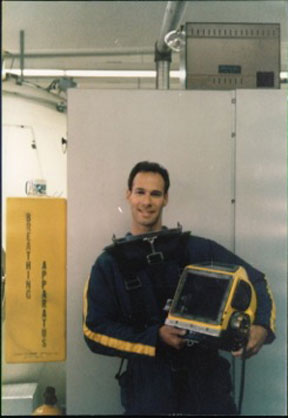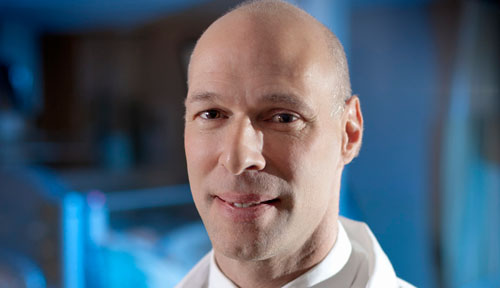Lots of faculty have had unusual jobs before coming to UNMC. Jeffrey Cooper, M.D., assistant professor of emergency medicine and director of the hyperbaric medicine center, was no exception.
He was an Undersea Medical Officer, which, while not as exciting as it sounds (he did not actually practice medicine underwater), was a bit of an adventure for a young doc.
Dr. Cooper had made a deal. The U.S. Navy had paid for his education. And so, Dr. Cooper then signed on for a four-year hitch.
“One year of medical residency,” he said, “and then I was out there with the fleet, going out to exotic southern Pacific ports.”
Dr. Cooper practiced submarine medicine and diving medicine.
“We were the only facility in probably 1,000 miles in any direction,” he said.
And he was the only diving medical officer at that facility.
 |
Dr. Cooper |
Dr. Cooper had to graduate not only from the Naval Undersea Medical Institute, but also from the famed Navy dive school (the Navy Diving and Salvage Training Center).
He saw some profound “bends” cases in the service. That’s what happens when divers come up too quickly, changing pressure faster than the body can handle, and nitrogen absorbed from the air starts to bubble within a person’s bodily fluids.
“The more severe manifestation is, you get bubbles in the bloodstream, and they go to the brain and can cause stroke-like symptoms,” Dr. Cooper said.
It can also cause brain and spinal cord damage. To treat it, Dr. Cooper would use hyperbaric oxygen therapy, supervising the divers’ re-compression in a hyperbaric chamber.
This experience has proven invaluable in his current role as emergency specialist and medical director at the hyperbaric medicine center. Much of what he does now is based on the same principles he used to treat Navy divers.
After being stationed in Guam for two years, Dr. Cooper moved on to Charleston, S.C. Then a few years in the reserves. But he still heeds the call of the sea.
He once sailed the East Coast and the Bahamas for a year.
And when he was an ER doc in Tacoma, Wash., he lived on a boat.
